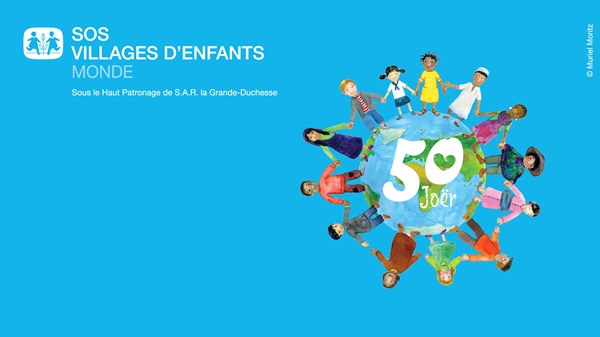 Credit: SOSVEM
Credit: SOSVEM
On the occasion of the 50th anniversary of SOS Villages d'Enfants Monde, Chronicle.lu had the opportunity to speak to Sophie Glesener, Managing Director of this Luxembourg-based non-profit organisation, to look back and also into the future.
Since 1974, SOS Villages d’Enfants Monde has been dedicated to the care, well-being and development of children globally. The Luxembourg-based organisation aims to inform the general public, raise funds, implement development programmes, support emergency aid and provide technical expertise. With the support of public and private partners, donors, sponsors and volunteers, the NGO supported 24 projects in 2023, benefiting over 60,000 individuals in fourteen countries. SOS Villages d’Enfants Monde focuses on long-term development programmes in West Africa and Uzbekistan, as well as emergency responses to conflicts, natural disasters and crises, to help protect and rebuild children's lives.
Chronicle.lu: Reflecting on the past 50 years, what are some of the most significant milestones or achievements that SOS Villages d’Enfants Monde has accomplished since its founding in 1974?
Sophie Glesener: Over the past half-century, there have been many important milestones in the life of the association that was originally SOS-Interfonds and, in 2005, took on its current name, SOS Villages d'Enfants Monde. The commitment of the pioneers - including Marcel Nilles from Luxembourg, Barbara François from Belgium and Hermann Gmeiner from Austria - was decisive, and in 1986 the small charity was approved by the Luxembourg Ministry of Foreign Affairs and became an NGO. In 2010, it signed its first Framework Agreement with the Ministry. This was the time when it took the development turn, moving from support for SOS Villages d'Enfants to family strengthening programmes to prevent child abandonment and consolidate biological families. And since 2017, it has gone even further with ambitious programmes to support communities and child protection stakeholders.
Key moments include the beginnings of fundraising and the first solidarity events: in January 1976, the launch of sponsorships, which were to become a key element in fundraising, and in December of the same year the first Gala Concert with the RTL Orchestra. Half a century later, this fine tradition continues with great conductors, renowned soloists and, since 2015, the young winners of the prestigious Queen Elisabeth Competition.
Chronicle.lu: How have the partnerships with public and private entities (including the support from the Ministry of Foreign and European Affairs and Luxembourg’s Grand Duchess), evolved over the years?
Sophie Glesener: After being honoured by the High Patronage of Grand Duchess Joséphine-Charlotte, Her Royal Highness Grand Duchess Maria Teresa has been granting her High Patronage since 2005. She has also been in the field and received representatives of SOS Villages d’Enfants Monde and of the international federation. The Grand-Ducal family also regularly takes part in our major cultural and solidarity events.
Support from public and private partners has grown steadily, with an increasing number of foundations, companies, local authorities and schools backing SOS Villages d'Enfants Monde projects set up in the field with its SOS sister associations. Last year, we were able to count on the generous solidarity of 166 companies, 50 organisations, 30 public institutions and five foundations.
With the Ministry of Foreign and European Affairs, things have developed very positively since the initial co-financing. In 2022, SOS Villages d’Enfants Monde signed its fourth Cooperation Agreement (2022-2026). It focuses on the rights of children and young people, community dynamics and social cohesion, and includes thirteen ambitious programmes deployed in five countries (Benin, Guinea, Niger, Senegal and Uzbekistan). These reach over 2,300 vulnerable families, 10,500 children, adolescents and young people, and 10,000 members of state and community structures.
Chronicle.lu: Please share how the organisation’s programmes and initiatives have adapted to the changing needs of vulnerable children and families over the past 50 years, particularly in response to global crises and emergencies.
Sophie Glesener: Although the programmes of SOS Villages d'Enfants Monde - in the wake of those of the federation SOS Children's Villages International of which it is a member - have changed, the objectives have remained the same: to ensure that no child grows up alone, that everyone can live their childhood to the full and that vulnerable children and young people around the world can live better lives within their families and communities. To achieve this, they must be protected and their rights must be respected. Hence the need to raise awareness, advocate and strengthen child protection.
In addition, as crises and wars multiply and needs increase, SOS Villages d’Enfants Monde and its partners try to respond as efficiently as possible by supporting populations in emergencies and then over the long term helping them strengthen their resilience.
Chronicle.lu: As SOS Villages d’Enfants Monde celebrates half a century of existence, what are the key goals and priorities for the next decade? How does the organisation plan to continue its mission in the face of emerging global issues?
Sophie Glesener: Faced with today's burning issues and a globalised world, we need to ensure that our projects are sustainable and inclusive and that the work we do with our beneficiaries is effective. We need to redouble our efforts to deal with crises, particularly climate change, and strengthen our local partners and SOS colleagues. Furthermore, here in Luxembourg, we need to build loyalty among our partners, donors, sponsors, ambassadors, volunteers and friends, and also reach out to new audiences, and even young people, which means constantly renewing and diversifying our activities.
Chronicle.lu: How do you plan to mark this occasion? Are there any special events, campaigns, or initiatives being launched to celebrate the 50th-anniversary milestone and engage the community?
Sophie Glesener: This anniversary year is packed with events and festivities. In May, POST Luxembourg issued a beautiful commemorative stamp to mark our jubilee. In June, a CFL locomotive decked out in the colours of SOS Villages d'Enfants Monde travelled the country's railways, and from mid-July onwards a fine poster campaign will be running in Luxembourg stations. In addition, six SOS ambassadors are currently delivering a beautiful birthday message in a video clip that can be found on our social networks. To round off these events, a major anniversary concert will be held on 10 October, the day SOS Villages d'Enfants Monde was founded, at the Philharmonie in the company of loyal SOS friends.

© Alea Horst








